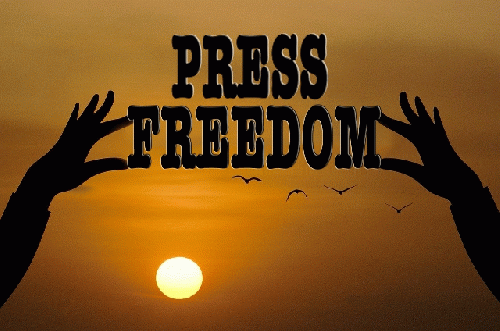
Democracy depends on press freedom.
(Image by Mohamed Mahmoud Hassan and William Dunkerley) Details DMCA
Did you notice that we've lost the press freedom that is essential in our democracy? If you're like many people, probably not.
Do you believe that a free press is a Constitutional guarantee? Most people likely think it is indeed guaranteed. Actually, it is not.
Here's the real story as I see it:
"Freedom of the press is an implicit and essential right of the people. It is not just freedom of speech for journalists. If a democracy is going to work, citizens have got to make informed political choices. The media are the people's primary means for keeping informed. Many believe that press freedom exists if the media are free of governmental control and that pluralism prevails. That view misses the main point. A good share of the media has got to be free to serve the people."
Those were my opening comments when the World Association of Newspapers invited me deliver the Keynote Address at the Press Freedom Forum of its 2006 World Congress.
Separately, a published report from the U.S. Agency for International Development tells us of another vital point. It is that the press "serves a 'checking function' by ensuring that elected representatives uphold their oaths of office and carry out the wishes of those who elected them." Often this is called being a "watchdog."
Now, here in 2024, much of our news coverage is devoid of those fundamental principles. Tune in to CNN or MSNBC and you'll hear people serving their audiences with bias and persuasion, forthrightly favoring their preferred political candidates. Switch to Fox News and you'll hear the same thing, but with an opposite political twist.
These biased or dishonest news services are not violating any law. They are free to do what they're doing. But in those cases voters are not being served consistently honest, unbiased information on which to base reasonable choices of leaders or to detect failures in existing leadership. Real news seeks to report, not persuade.
Network news has bias too. But it is not as consistent as cable news, and not as intense. Nonetheless it is still not a consistently reliable source for honest news.
As to a constitutionally guaranteed free press? Many believe we have that guarantee. For example, a free speech center at an American university states flatly, "Freedom of the press is a Constitutional guarantee contained in the First Amendment, which in turn is part of the Bill of Rights." That might be a good fund raising line for the university. But it's not true.
All the constitution does is to prevent the Congress from enacting laws that would "abridge" the "freedom of the press." The honest, unbiased reporting that we need as citizens is not guaranteed. Instead that is left to the media marketplace. And the marketplace is not giving preference to honest reportage.
In our overall economic marketplace we can see people choosing the best of almost everything -- of cars, of restaurants, of entertainment options. They choose what's best for them. Their discriminating tastes allow for the products and services that serve them best to prevail. For some reason that is not working when it comes to media choices. Why not?
It's not that Americans think that a free press is unimportant. A recent Pew Research report found that "most Americans say press freedom is important to society." Pew's study showed that 73 percent of U.S. adults admit that it is very or extremely important. Only eight percent find it not at all important.
Recognizing the value of press freedom, however, is just not translating into voter selection of news sources that allow them to be smart, informed voters. Why not?
(Note: You can view every article as one long page if you sign up as an Advocate Member, or higher).





